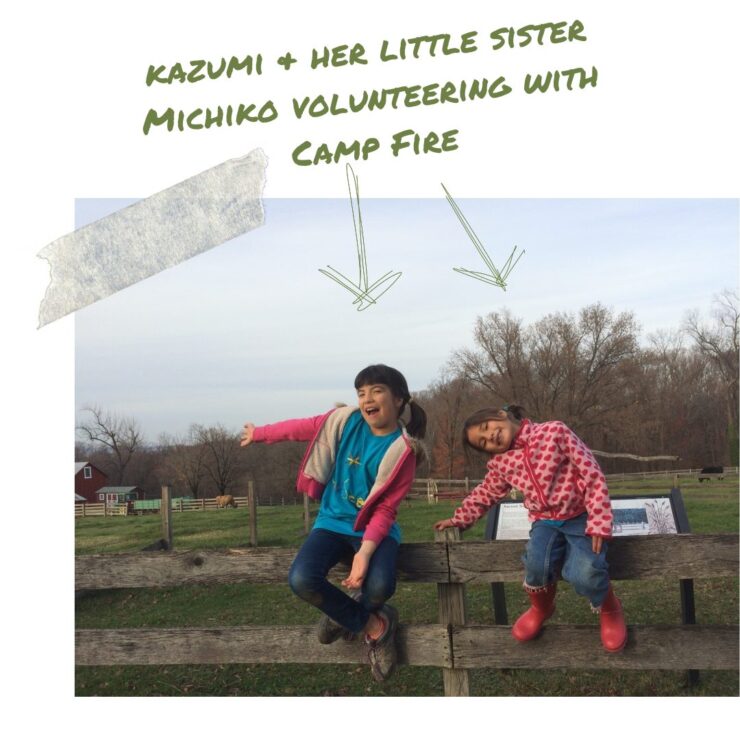Embrace Your Own Ecosystem
 As we get ready for Earth Day, we’re curious how our community is responding to environmental challenges in an everyday way. It’s easy to feel powerless in the face of dire headlines about climate change impacts and the need for huge systemic changes. We started looking for examples of what everyday environmental action could look like…and found Kazumi.
As we get ready for Earth Day, we’re curious how our community is responding to environmental challenges in an everyday way. It’s easy to feel powerless in the face of dire headlines about climate change impacts and the need for huge systemic changes. We started looking for examples of what everyday environmental action could look like…and found Kazumi.
Kazumi Haag is a fourth-generation Camp Fire participant and a National Youth Advisory Cabinet member. Her dad, Eric, a biologist at the University of Maryland, started Spark Seekers, a Camp Fire group for Kazumi and her friends in College Park when they were grade schoolers. Growing up in Nevada, Eric had joined his sister’s Camp Fire troop because he wanted more outdoor experiences than he was getting in the local Boy Scouts. Eric’s dad (Kazumi’s grandfather) led that Camp Fire group. He was inspired by his mother (Eric’s grandmother and Kazumi’s great-grandmother), who joined Camp Fire in Florida in 1910, the year it began.
Kazumi grew up hiking and car camping with her family and Camp Fire buddies, but her relationship with the environment deepened when she joined the crew team her freshman year of high school.
Kazumi’s team rows five days a week on the Anacostia River. The Anacostia runs almost nine miles between Prince George County in Maryland and Washington, D.C., where it merges with the Potomac River. The National Oceanic and Atmospheric Administration calls it, “one of the Chesapeake Bay’s most heavily altered and contaminated watersheds.” Contaminates from nearby hazardous waste sites and storm and sewage runoff have challenged the river’s ecosystems for decades. It is illegal to swim in the Anacostia outside of closely monitored special events, and there are multiple warnings against eating the river’s fish.
“It’s a very polluted river,” said Kazumi. “You’ll come down to the dock to put your boat in the water, and you can’t because there's so many plastic bottles that it's like a barricade around the dock. It’s very disheartening, but it's also made me want to help clean the river and make sure that it gets better.”
Thanks to the work the Anacostia Watershed Society and the Alice Ferguson Foundation does with the community, Kazumi already understood the environmental issues her local waterway faced. Kazumi had been on river field trips, learned watershed conservation practices, and participated in river clean-up days with her Camp Fire friends.
“One time, we went down to this site on the water, but there was no dirt next to the river, it was just packed trash,” remembered Kazumi. “There was just layers of plastic and plastic, almost like sedimentary rock”
“We filled up 30 30-gallon trash bags, and you couldn't tell that we did anything,” said Eric. “The trash was sort of like a geological feature. After that, I pick up any piece of plastic I see in the gutter now because I know where it's going.”
Kazumi’s crew team has a strict prohibition against plastic bottles and is working to reduce trash at their boathouse. They volunteer to help clean the smaller streams that flow into the Anacostia and plant trees, which help catch trash and filter stormwater runoff.
Her experiences on the Anacostia sparked Kazumi’s curiosity in conservation paired with human-centered environmental justice. She interns with the OneNature Institute, which “links holistic community well-being and wildlife stewardship.” And she’s also inspired by her mom, Shizuka, who works with air quality.
Next year, she’ll be going to Bates College (beside the much cleaner Androscoggin River) where she’s going to double major in environmental studies and biology. She’s particularly interested in giraffes, whales and whale sharks — big animals, in contrast to the tiny nematodes her dad studies. She credits Camp Fire for introducing her to that initial spark for conservation and a more everyday connection to nature.
“Camp Fire changed my perspective; it took me from loving animals to wanting to save them,” said Kazumi. “But also Camp Fire helps people just take a breather. Camp Fire has helped me and the other kids in our troop see that if you take a second to be outdoors and be at peace, it definitely helps.”
Eric echoes the importance of understanding the natural systems we live in. “It's around you all the time if you open your ears to it,” he said, citing neighborhood organizations doing grassroots environmental work, the vast educational resources at state parks, and scientists like Jason Munshi-South, who study wildlife in urban environments.
“In Kazumi’s generation, there's been a groundswell of interest in trying to reverse some of the harm that our modern human world has created for the planet,” said Eric. “There's opportunities everywhere. In every city, in every county in the United States, there are people concerned about some environmental aspects.”
This Earth Day, if you’re overwhelmed by the scale of our planet’s environmental problems or struck by waves of climate grief, try going back to basics: Go outside. Look around. Learn one thing about the ecosystem surrounding and supporting you.
“Just walking outside, even if it's in your neighborhood, helps you get nature in your life,” said Kazumi.
